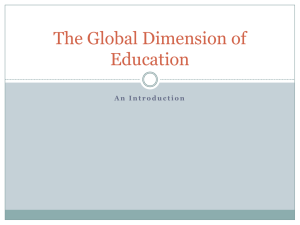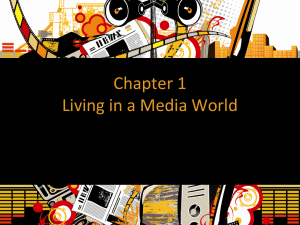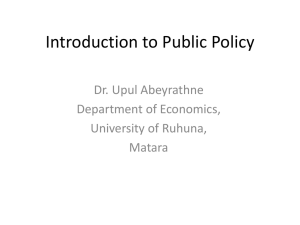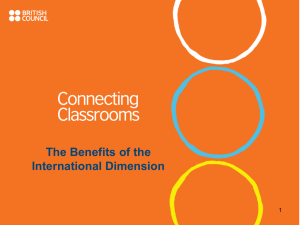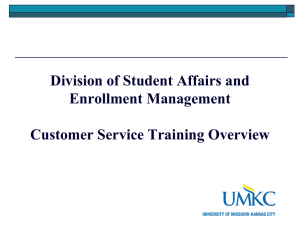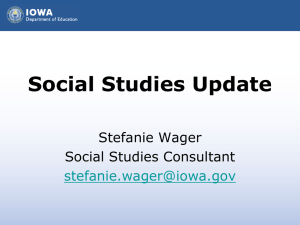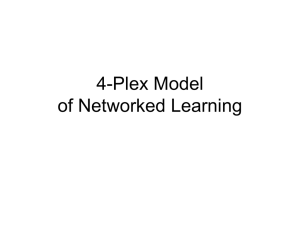The Global Dimension - EDUCATION for SOCIAL JUSTICE
advertisement
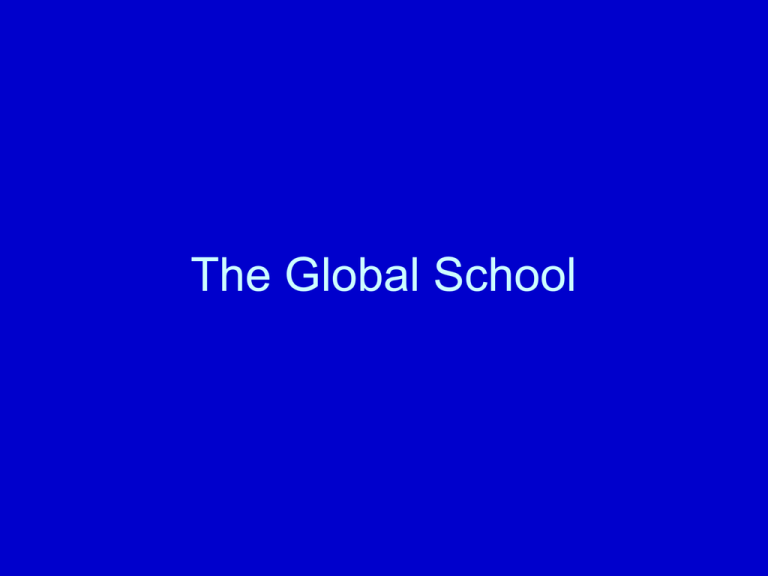
The Global School What will help create the global school ? Developing the Global Dimension in the School Curriculum 8 Global Dimension ’Aspects’ Diversity Conflict Resolution Interdependence Cultural Diversity Social Justice Values and perceptions Human Rights Sustainable Development Global Citizenship Global Citizenship Gaining the knowledge, skills and understanding of concepts and institutions necessary to become informed, active, responsible citizens. Conflict Resolution Understanding the nature of conflicts, their impact on development and why there is a need for their resolution and the promotion of harmony. Sustainable Development Understanding the need to maintain and improve the quality of life now without damaging the planet for future generations. Diversity Understanding and respecting differences and relating these to our common humanity. Social Justice Understanding the importance of social justice as an element in both sustainable development and the improved welfare of all people. Human Rights Knowing about human rights including the UN Convention of the Rights of the Child. Interdependence Understanding how people, places, economies and environments are all inextricably interrelated and that choices and events have repercussions on a global scale. Potential Contributions from the Global Dimension Potential Contributions • Learning the content (subject-based) • Developing skills: – literacy, numeracy, IT, interactive and participatory learning, critical thinking, emotional literacy • Engagement (of students, motivation=raised levels of expectation and achievement) • Cross-curricular links • Citizenship • Contributions to school initiatives: – e.g. Sustainable Schools, international links Global Dimension & Curriculum Links with the Curriculum Subject- based content • Knowledge & Understanding • Skills • Values & Perceptions Global Issue • Water; Waste; Poverty; Inequality; War etc. Global Dimension Global Citizenship Conflict Resolution Sustainable Development Diversity Social Justice Human Rights Interdependence Values and Perceptions How could you put the global dimension into practice in your school? Step 1 Establishing a Team • Why have a team? • Can the International / Citizenship Coordinator manage the initiative? Step 2 Action Planning • • • • • Who will be involved? What is the status of the initiative … & is there support from SMT & Governors? What is the timescale ? … & what can be realistically be achieved within it? • Who will ‘drive’ the process? • What support will be needed? • … developmental, resources, financial Next steps • Will all staff deliver the Global Dimension or just some ? • What is the level of interest, understanding and commitment to the work? • Will the staff feel confident enough in manipulating the issues to develop new lessons and schemes of work? • Would staff Training be useful? Step 3 Training • Will staff feel training on the Global Dimension is a priority? • How much training will be needed? • Who can provide it ? Why is training useful? • To develop understanding, knowledge and confidence in teaching aspects of the Global Dimension • To collaborate with other colleagues and professionals in the process of curriculum development • To see the relevance of the Global Dimension in your own subject specialism • To be more aware of cross-curricular approaches and themes Step 4 Auditing the curriculum • Is this going to be a big job? Approaches to Curriculum Audits • Global Dimension • Global Citizenship • Benchmarking • SEF’s Global Dimension Audit Preparing for the audit • Understanding of - ‘why we’re doing it’ - how it will influence and impact on teaching - how it might benefit pupils and impact on learning • Knowledge & understanding of the Global Dimension / Global Citizenship concepts Step 5 Teaching and Learning • Reviewing Schemes of Work in response to the audit/benchmarking process • Writing new lesson plans or revising existing ones • Considering different methodologies for teaching about controversial global issues • Evaluating the ‘learning objectives’ to see if aspects of the global dimension are explicit Step 6 Delivery Reflecting on, reviewing, evaluating…. the impacts on learning • What will students have learned as a result of the lesson? • How will it ‘empower’ them as Global Citizens? • What action might they take as a result what they have learned? • Has it contributed to the development of new values and attitudes? • Have their perceptions of ‘the South’ changed? • Do they have a better understanding of Sustainable Global Development? • Are they likely to have a greater commitment to Social Justice? Whole School Approaches The Global School Training • 1 Whole School Intro to Global Dimension • 2 Twilight for all staff followed by individual sessions tailored for Year group/ Keystage / Departmental • 3 Mentoring sessions • 4 Global Dimension Seminars • 6 Project-based training • 5 Other External Courses CPD Providers • Local Authorities and CYPS • Development Education Centres • Yorkshire & Humber Global Schools Association • Other NGOs and Agencies e.g UNICEF, Global Schools Partnerships Global Citizenship K&U • A sense of the local environment and of the wider world • Understand the role of culture in your and others’ identity • Where are key decisions made? Skills • Listening to others and their viewpoints • Develop an enquiring mind • Develop the skills to evaluate global issue critically Global Citizenship Values & Perceptions • Willingness to cooperate • Growing interest in world events • Taking responsibility for self and others Conflict Resolution • • • • K&U Our actions have consequences Causes and impact of conflict and resolution Strategies for conflict prevention Understanding that injustice feeds conflict Skills • Cooperation, sharing, accepting group decisions • Learning to resolve conflicts peacefully • The importance of compromise and negotiation Conflict Resolution Values & Perceptions • Willingness to admit and learn from mistakes • Respect, empathy, tolerance • Belief that people can make a difference Sustainable Development K&U • Our impact on the environment – now and in the future • Awareness of finite resources • Poverty affects sustainable development for all Skills • Making choices and recognising the consequences of choices • Critical thinking Sustainable Development Values & Perceptions • Quality of life is about more than economic development • Responsibility for resources and how they are used • Without sustainable development for all there may be more conflict Diversity K&U • Awareness of similarities and differences globally and locally • Contribution of different cultures • Prevention of prejudice Skills • Detecting bias and stereotypes • Stating opinions based on evidence • Challenging prejudice Diversity Values & Perceptions • Valuing one’s self • Sense of curiosity and growing respect for difference and diversity in people and environment • Sense of justice Social Justice K&U • Awareness of fair/unfair – rich/poor • Fairness and equality between groups • Consequences of inequality (past and present) Skills • Taking action on unfairness e.g. challenging injustice • Responding to the needs of others • Belief that people can make a difference Social Justice Values & Perceptions • Awareness that own actions have consequences on others • Individuals can make a difference • Willingness to speak up for others Human Rights K&U • What are rights and responsibilities • Human Rights are universal and challenge inequalities and prejudices Skills • Listening to others and their viewpoints • Recognizing when human rights are denied (past and present) Human Rights Values & Perceptions • Concern for others in immediate and wider circle • Empathy locally and globally • People can make a difference Interdependence K&U • Sense of immediate, local and wider world • Influence of culture and ideas have on each other • Impact UK has on the quality of life elsewhere Skills • Making choices and understanding the consequences of choices • Appreciate the link between the lives of others and that of our young people Interdependence Values & Perceptions • Valuing others as equal and different • Empathy towards others both locally and globally • Belief that people can make a difference V. Supporting Diversity Education • Embedding the Global Dimension in the curriculum • Developing Local Links • Setting up a Nouth South Link 8 Global Dimension ’Aspects’ Diversity Conflict Resolution Interdependence Cultural Diversity Social Justice Values and perceptions Human Rights Sustainable Development Global Citizenship Leeds DEC support • Training • Advice and consultancy • Curriculum Development initiatives - Entitlement & Enrichment - Global Schools UK • Resources - Teaching materials – Topic Boxes - Artefact Box loan • Global Schools Award Developing Cultural Awareness • Working with authentic material in the target language • Communicating with native speakers • Considering their own culture and comparing it with others where the target language is spoken • Considering the experiences and perspectives of people in these countries

